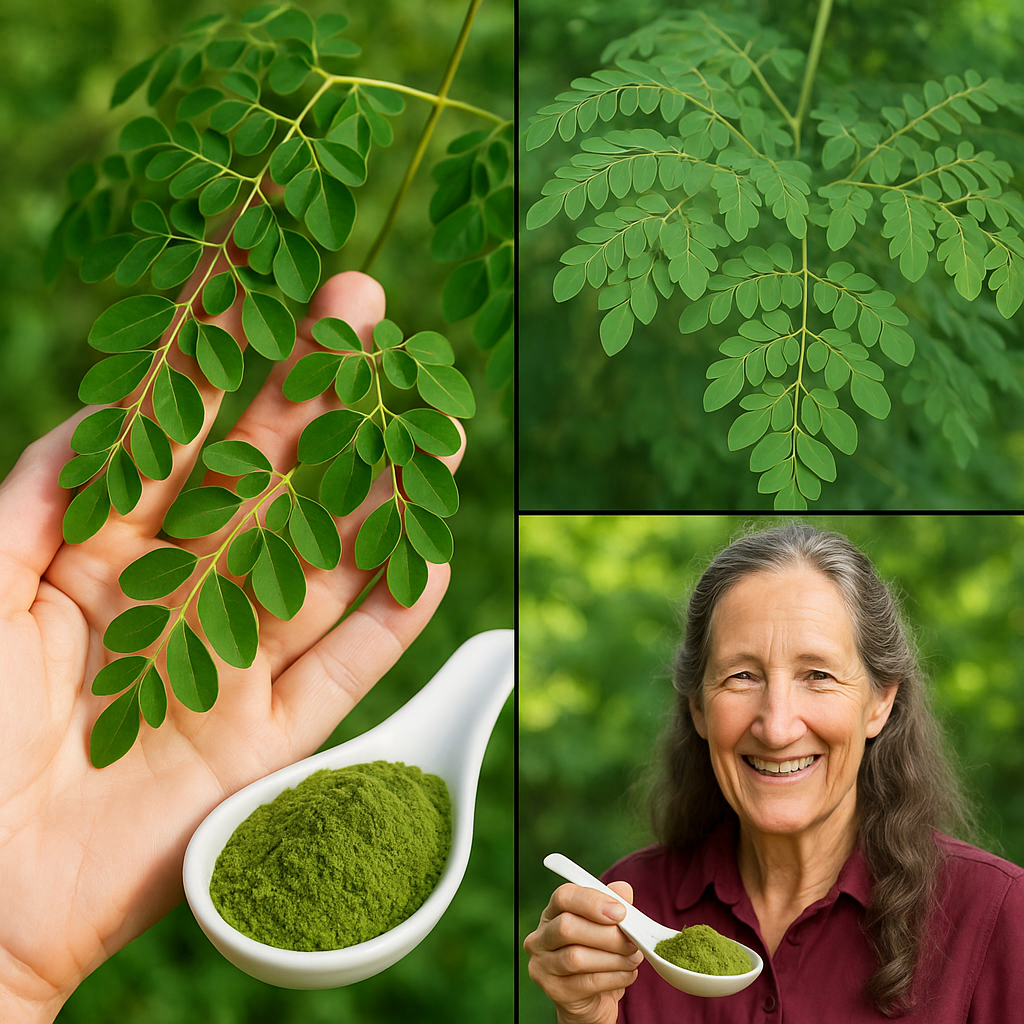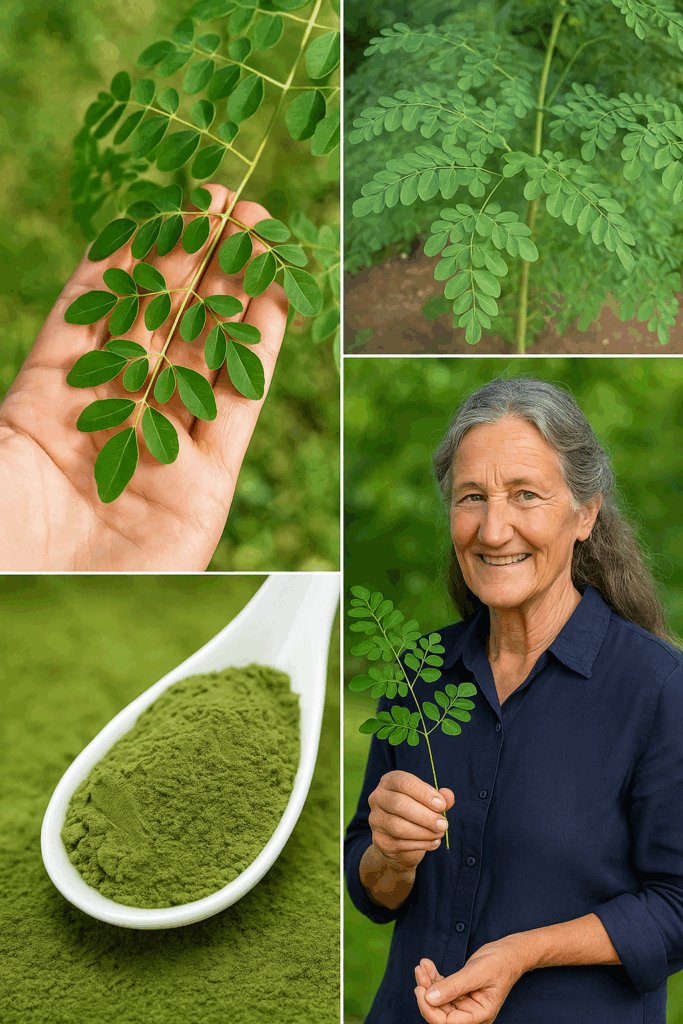Moringa, often celebrated as the “Miracle Tree,” has been revered for centuries for its extraordinary healing potential. Originating from the foothills of the Himalayas, this versatile plant has long been a cornerstone of traditional medicine, valued for its nutrient-rich profile and ability to support overall wellness. In recent years, moringa has captured the attention of the modern health community, offering a natural way to boost vitality and longevity.

🌿 Top 10 Health Benefits of Moringa
1. Nutrient-Dense Superfood
Moringa is packed with essential nutrients, including vitamins A, C, and E, along with minerals like calcium, potassium, and iron. A single serving of moringa leaves can provide a significant portion of your daily nutritional needs, making it a natural and powerful dietary supplement.
2. Powerful Antioxidant Properties
Moringa contains potent antioxidants such as quercetin and chlorogenic acid. These compounds help protect the body from oxidative stress, reduce inflammation, and promote healthy aging by neutralizing harmful free radicals.
3. Boosts Immune System
Thanks to its high vitamin C and iron content, moringa strengthens the immune system, making it easier for the body to fend off infections and illnesses naturally.
4. Supports Heart Health
Moringa has been shown to help regulate cholesterol levels and lower blood pressure. Its antioxidants reduce inflammation in the cardiovascular system, contributing to a healthier heart and better overall circulation.
5. Improves Digestive Health
With its high fiber content, moringa promotes healthy digestion and regular bowel movements. Its soothing properties may also benefit individuals dealing with conditions like irritable bowel syndrome (IBS) or gastritis.
6. Enhances Skin Health
Moringa’s abundance of vitamin E and antioxidants supports skin health by promoting collagen production, reducing signs of aging, and helping to maintain a vibrant, youthful complexion.
7. Supports Brain Health
Rich in neuroprotective compounds, moringa supports cognitive function and mental clarity. Its vitamin C and E content help combat oxidative stress in the brain, which may lower the risk of neurodegenerative diseases.
8. Regulates Blood Sugar Levels
Research indicates that moringa can help balance blood sugar levels, making it beneficial for individuals with diabetes or those seeking to maintain healthy glucose levels. It improves insulin sensitivity and reduces post-meal blood sugar spikes.
9. Potent Anti-Inflammatory Effects
Moringa’s natural compounds, such as isothiocyanates, provide strong anti-inflammatory benefits, helping to reduce chronic inflammation that underlies many modern health conditions, including heart disease and autoimmune disorders.
10. Supports Weight Management
Moringa helps with weight management by promoting satiety and stabilizing blood sugar levels. Its high fiber content helps reduce cravings and supports metabolism, making it a valuable addition to a healthy lifestyle.

🌸 How to Use Moringa for Maximum Benefits
Fresh Moringa Leaves
Harvest fresh moringa leaves and wash them thoroughly. Add the leaves to salads, soups, or stir-fries. You can also lightly sauté them with olive oil and garlic for a nutritious side dish similar to spinach or kale.
Drying and Making Moringa Powder
To preserve your moringa harvest, air-dry the leaves in a shaded, well-ventilated area until crisp. Once dried, grind them into a fine powder using a blender or mortar and pestle. Store the powder in an airtight container and sprinkle it into smoothies, yogurt, or baked goods.
Moringa Tea
Steep a handful of fresh leaves or a teaspoon of dried moringa powder in hot water for 5 to 7 minutes to make a refreshing tea. Add lemon and honey for enhanced flavor and additional health benefits.
Using Moringa Pods (Drumsticks)
Young moringa pods are tender and delicious. Cut them into small pieces and cook them into soups, curries, or stir-fries. They add a mild, nutty flavor and extra nutrients to any dish.
Harvesting and Eating Moringa Seeds
Once the pods mature and dry, collect the seeds. You can eat moringa seeds raw or roasted or extract moringa oil from them. Moringa oil is highly prized for cooking and skincare thanks to its light texture and nourishing properties.
🌱 Tips for Growing and Enjoying Moringa
Growing your own moringa tree ensures you have a constant supply of fresh, potent leaves, pods, and seeds. Start by using the fresh leaves in small amounts and gradually increase your intake as your body adjusts. Experiment with different ways of incorporating moringa into your meals to find your favorite methods.
🌿 Mindful Consumption: Important Considerations
While moringa is generally safe for most people, it is advisable to start with small amounts to avoid digestive discomfort. Pregnant and breastfeeding women should consult a healthcare provider before consuming moringa in large quantities. Always wash fresh leaves thoroughly before using them, and choose organic or pesticide-free sources whenever possible.
🌟 Conclusion: Embracing the Power of the Miracle Tree
Moringa offers a wealth of health benefits that can elevate your well-being naturally. By adding moringa to your daily routine through teas, meals, or supplements, you can harness the full potential of this ancient healing plant. Whether you grow it yourself or buy it from a trusted source, moringa truly lives up to its title as the “Miracle Tree.”
Start slowly, savor the process, and allow this nutrient-dense powerhouse to become a vital part of your journey toward vibrant, natural health.


